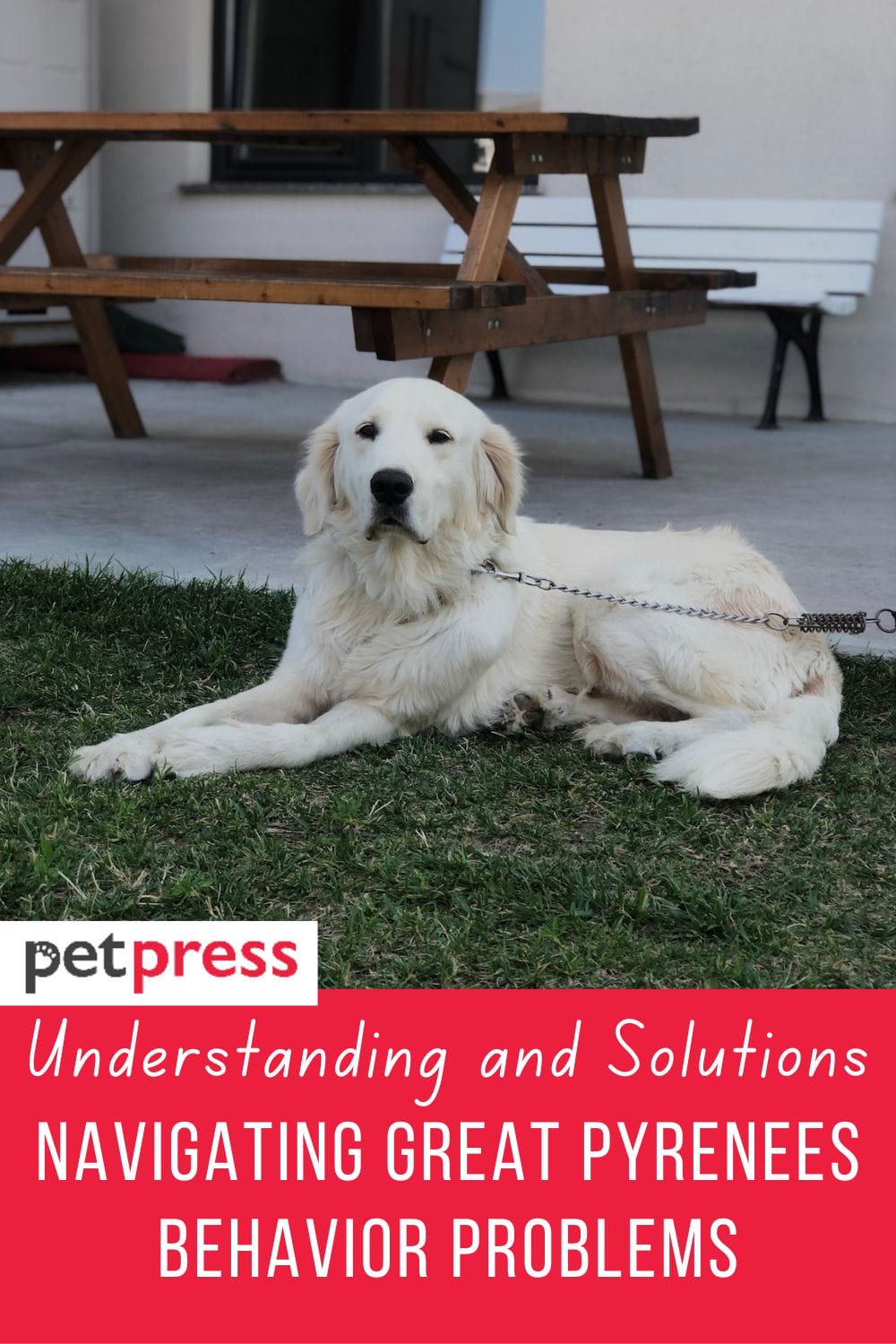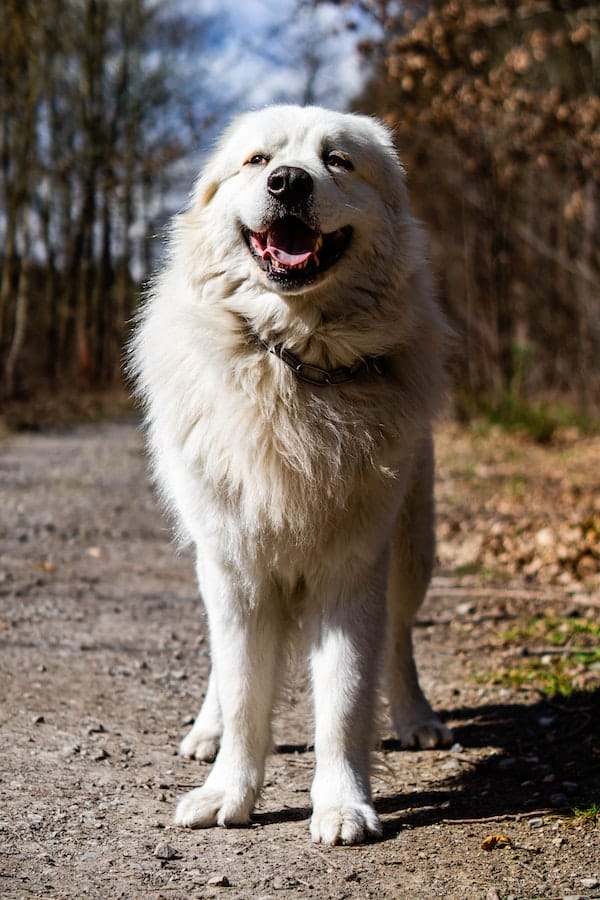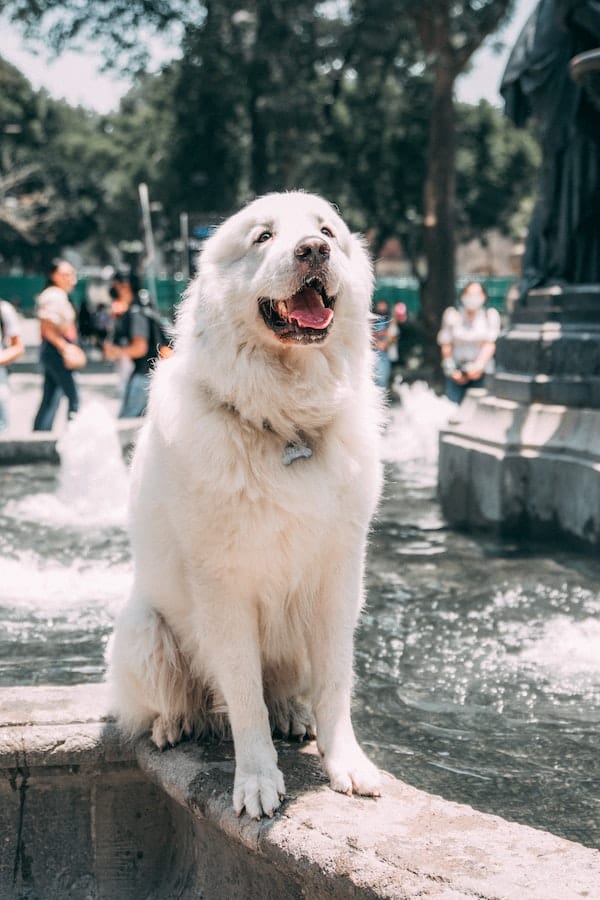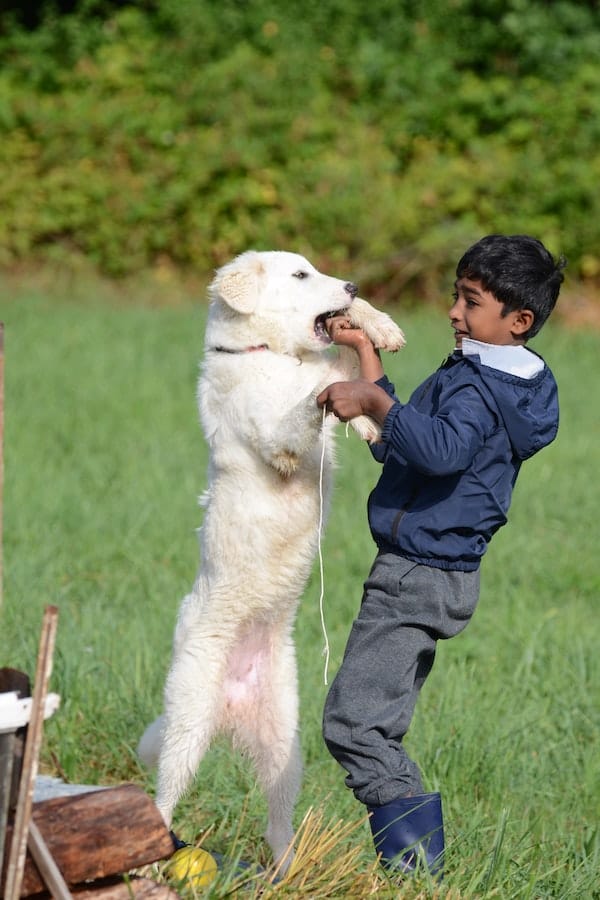
Great Pyrenees, known for their majestic presence and gentle nature, have secured a special place in our hearts as beloved companions.
Yet, much like any breed, they encounter their share of behavior challenges.
In this article, we will embark on a journey to explore some of the common behavioral issues that may arise in Great Pyrenees, dig into the possible root causes, and offer practical insights to both prevent and effectively tackle these concerns.
Most Common Great Pyrenees Behavior Problems:
Great Pyrenees, celebrated for their remarkable protective instincts and strong independence, are no strangers to certain behavioral concerns.
Among these, you may encounter issues such as:
Excessive barking
The great Pyrenees, renowned for their vocal nature, have a propensity for indulging in prolonged bouts of barking.
This behavior is deeply rooted in their protective instincts and a genuine desire to serve as diligent sentinels for their owners.
Whether it’s the rustling of leaves or a distant sound, Great Pyrenees view these occurrences as potential threats that necessitate immediate vocal alerts.
Territorial aggression
The Great Pyrenees’ intrinsic protective tendencies can occasionally manifest as territorial aggression.
These gentle giants take their roles as guardians quite seriously, and as a result, they may perceive unfamiliar individuals or animals encroaching on their designated space as potential threats.
This territorial behavior is essentially a form of defensive posturing, driven by their unwavering dedication to safeguarding their surroundings and loved ones.

Stubbornness
Great Pyrenees, while undeniably intelligent, are no strangers to bouts of stubbornness, particularly when it comes to training.
Their independent streak often leads them to carefully weigh their options before complying with commands.
This selectiveness in following instructions can sometimes pose challenges for owners seeking seamless obedience.
Strong prey drive
The great Pyrenees, owing to their rich history as dedicated livestock guardians, come equipped with a formidable prey drive.
This innate instinct compels them to exhibit a keen interest in chasing smaller animals, a behavior deeply ingrained in their genetic makeup.
While this trait harkens back to its historical role in protecting livestock from potential threats, it can pose challenges in modern settings.
Separation anxiety
Great Pyrenees, with their inherently social nature, often grapple with separation anxiety when left alone.
This deep attachment to their human companions can manifest in various anxious behaviors, including incessant barking, destructive chewing, and frenzied digging.
Recognizing the signs of separation anxiety is crucial for owners to address this issue effectively.
Boredom
Great Pyrenees thrive on activity and mental stimulation, making boredom a potential source of concern.
Without adequate exercise and engagement, these intelligent dogs may find themselves grappling with boredom-induced restlessness.
This restlessness can manifest in a variety of destructive behaviors, including but not limited to barking, chewing, and digging.
Potential Reasons Behind Behavior Problems:

Behavioral issues that arise in Great Pyrenees, much like in any breed, often find their roots in a complex web of underlying causes. Let’s delve into some potential underlying causes:
Lack of socialization
A dearth of early socialization experiences can be a significant trigger for behavioral problems.
The great Pyrenees, being naturally protective and sometimes reserved, benefit immensely from exposure to various people, animals, and environments during their formative stages.
The absence of these experiences may lead to apprehension, fear, or defensive behavior in unfamiliar situations.
Genetics
Genetics plays an essential role in shaping a dog’s temperament and behavior.
Certain behavioral traits may be inherited from parents or ancestors, making it crucial for breeders to select breeding pairs carefully.
While genetics aren’t the sole determinant of behavior, they do contribute significantly.
Fear or anxiety
Fear and anxiety can be potent drivers of undesirable behavior.
The great Pyrenees, despite their imposing stature, may be prone to fear-based responses in certain situations.
Identifying the specific triggers for fear or anxiety and implementing gradual desensitization and counter-conditioning techniques can help alleviate these issues.
Medical issues
It’s important to recognize that some behavioral problems may have an underlying medical basis.
Pain, discomfort, or neurological issues can manifest as behavioral changes.
A thorough veterinary examination is essential to rule out any medical conditions contributing to the problem.
Past experiences
Previous traumatic or negative experiences can leave a lasting impact on a dog’s behavior.
Rescued Great Pyrenees, for example, may exhibit specific challenges rooted in their past.
Understanding and addressing these past experiences is vital in providing effective care and support.
Tips for Preventing Great Pyrenees Behavior Problems:

Preventing behavior problems in Great Pyrenees is a proactive approach that paves the way for a harmonious and enriching companionship.
Here’s a comprehensive guide to prevention:
Early socialization
Commencing socialization endeavors in the early stages of your Great Pyrenees life is paramount.
This consistent and early exposure entails introducing them to diverse people, animals, environments, and situations.
The invaluable experience garnered during puppyhood nurtures their social skills, engenders confidence, and reduces the likelihood of fear or aggression toward the unfamiliar.
This foundational socialization lays the groundwork for a well-adjusted and sociable companion.
Positive reinforcement training
Embracing the art of positive reinforcement training ushers in a world of cooperative and well-behaved Great Pyrenees.
These techniques, hinged on rewarding desired behaviors with treats, praise, or affection, empower your canine friend to establish positive associations.
Consequently, they willingly embrace commands and respond to your guidance with enthusiasm and eagerness, fostering an enduring bond built on trust and respect.
Consistent rules and boundaries
Crafting a household brimming with clear and unwavering rules and boundaries is a blueprint for your Great Pyrenees’s contentment.
These deliberate guidelines, set right from the start, provide your furry companion with a palpable sense of structure and security.
They thrive when they comprehend their role and position within the family hierarchy, ensuring a harmonious coexistence grounded in mutual understanding.
Mental stimulation
Engaging your Great Pyrenees’ intellectual faculties is akin to nurturing their mental well-being.
This can be achieved through a medley of stimulating activities, including puzzle toys that tantalize their problem-solving prowess, interactive games that keep them mentally agile, and obedience training sessions that challenge their cognitive abilities.
The provision of mental stimulation is not merely a pastime; it serves as a robust deterrent against the perils of boredom and the consequent emergence of destructive behavior.
Exercise regimen
The inherent need for physical activity is etched into the DNA of the Great Pyrenees.
To honor this fundamental aspect of their nature, it is imperative to institute a daily exercise regimen.
Whether it’s leisurely walks that allow them to soak in the surroundings, invigorating hikes that sate their adventurous spirit, or spirited playtime that expends their boundless energy, exercise is the cornerstone of their physical well-being.
Routine veterinary care
Ensuring the well-being of your Great Pyrenees necessitates a commitment to routine veterinary care.
Scheduled check-ups serve as a vigilant guardian against potential health issues that may underlie behavioral problems.
Some behavioral challenges may have medical roots, and timely veterinary assessments can swiftly address any underlying health concerns.
By prioritizing regular veterinary care, you provide your beloved companion with the best chance for a happy and behaviorally sound life.

Fear and anxiety management
Should you observe signs of fear or anxiety in your Great Pyrenees, it’s paramount to seek professional guidance.
These emotions can significantly impact their behavior and overall well-being.
The assistance of a trained canine behaviorist or veterinarian can provide invaluable insights and strategies to address these concerns effectively.
Techniques such as desensitization, which involves gradual and controlled exposure to fear-inducing stimuli, and counter-conditioning, which focuses on replacing negative associations with positive ones, can serve as powerful tools in alleviating fear and anxiety.
Early obedience training
Enrolling your Great Pyrenees in obedience training classes at the earliest suitable age is a proactive step towards fostering good behavior.
Early training reinforces essential commands, instills discipline, and bolsters your dog’s understanding of your expectations.
This foundational training not only shapes their behavior but also establishes a strong foundation for a respectful and cooperative relationship.
Positive exposure to new experiences
Gradual and positive exposure to new experiences, people, and environments is a cornerstone of building your Great Pyrenees’ confidence and reducing their fear of the unknown.
This deliberate and patient approach allows them to acclimate to novel situations at their own pace, ultimately bolstering their self-assuredness.
Through these positive encounters, your dog can navigate life’s diverse challenges with resilience and a sense of security.
Conclusion
Dealing with behavior challenges in Great Pyrenees may present its share of difficulties, but it’s important to remember that these hurdles are far from insurmountable.
With a generous dose of patience, a profound understanding of your canine companion, and a thoughtful approach to training and management, you can actively contribute to your beloved Pyrenees conquering these issues.
The result?
A life of harmonious coexistence and a bond that only grows stronger with time.
FAQs
Yes, through proper training and socialization, territorial behavior can be managed.
Some Pyrenees may experience separation anxiety, but it can be addressed with training and gradual desensitization.
While professional training can be beneficial, many behavior issues can be addressed with consistent, positive reinforcement training at home.
- Does Cat Litter Melt Ice? The Complete Guide to Winter Safety - January 30, 2026
- Happy Tail Dogs: Understanding This Common Canine Condition - January 29, 2026
- How Cold Can Outdoor Cats Handle? Feline Winter Safety - January 27, 2026


GIPHY App Key not set. Please check settings